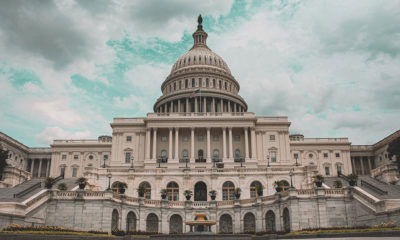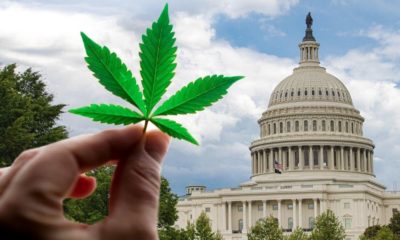
Economics
Cannabis Industry Pushes Congress for Small Business Support
A detailed rundown of testimony from members of the cannabis industry, who urged legislators to support cannabis companies like they do other small businesses.
The House Committee on Small Business heard testimony Wednesday morning from the cannabis industry, with the Heritage Foundation tagging along so certain Republicans on the committee would have someone to ask questions
Topics of discussion ranged from requests for access to the Small Business Administration (SBA), the status of ancillary small businesses that support the cannabis industry, and a number of other struggles for small business owners rooted in current federal policy.
The meeting was led by Rep. Nydia M. Velázquez, the first Puerto Rican woman elected to Congress. She presented a thoughtful lineup for the meeting after noting the committee was considered the most bipartisan in Congress.
“Today we’re here to draw what I believe is needed attention to an industry that is rapidly evolving,” she told the packed house.
Velázquez said as the industry grows, small businesses are emerging at the forefront. “It’s important for us to shed light on the challenges these small entities face, as well as the economic potential they offer,” she said. She went on to note on the market’s growth in 2018 and expectations for the future.
Velázquez said she is working on legislation that will open some of the Small Business Administration’s programs to legal cannabis companies. She said that though we know the industry is growing, that growth is “mirrored by inconsistent federal and state laws that are creating barriers for small businesses.”
She closed noting she understood there are different views on the legalization of cannabis, but urged the rest of the committee to disagree without being disagreeable. “Our committee has had a long history of approaching issues in a thoughtful and constructive way to best represent the interests and concerns of entrepreneurs and small businesses,” she said. “As the ranking member, and I always say, there are no Republican small businesses or Democrat small businesses, only American small businesses.”
The ranking Republican, Rep. Steve Chabot of Ohio’s 1st District, took the reins of the opening statement and went for a much different tone than Velázquez. Chabot noted the hearing’s crowd size and went on to agree with the Chairwoman’s take on the committee’s civility.
“Unfortunately, today is one of those times the philosophical divide between the perceptions of how we should move forward deviates,” he said. “But as is our custom, I expect we will do so respectfully.”
Chabot went on to remind everyone marijuana is the most-used illicit drug in the United States and cited standard anti-pot talking points based on NIDA research. He said he understands that most places have decriminalized some aspect of marijuana but went on to talk about youth use rates. He declined to cite those rates are actually going down.
“While I understand there may be entrepreneurial opportunities in this area, it’s my opinion the dangers outweigh those opportunities,” Chabot said before yielding.
The Chairwoman went on to introduce Shanita Penny, president of the board of directors at the Minority Cannabis Business Association, Veterans Cannabis Coalition founder and CEO Eric Goepel and cannabis banking expert Dana Chaves. Chabot countered with the Heritage Foundation’s senior legal research fellow and (unofficial) drug policy guy Paul Larkin. Larkin previously served as counsel to the Senate Judiciary Committee and ran Sen. Orrin Hatch’s crime unit.
Penny kicked off the testimony. She immediately spoke on MCBA’s effort to build a cannabis industry conducive to equitable cannabis policy, restorative justice, community reinvestment and economic empowerment for the communities hit the hardest by the war on drugs.
“Equitable economic development and empowerment unlock the full potential of the local economy by dismantling barriers and expanding opportunities for low-income people and communities of color,” Penny told the committee.
Penny says while MCBA is working tirelessly to create that equitable industry, lack of access to agencies like the SBA is crippling their efforts. She said six-figure startup fees would be challenging for lots of people, but they are especially hard on local equity permit licensees.
“Without access to capital, they are vulnerable to predatory lending and business practices,” said Penny. “These business owners need SBA support and resources to start their businesses, not business partners and investors that take advantage of equity programs to enter the market early or tokenize their partners for market share.”
Penny and MCBA suggested Congress require that the SBA collect data on the availability and provision of SBA services to minority cannabis business owners, issue a report to Congress and require the SBA to collect and report data on the denial of loans and aid on the sole basis of a prior cannabis conviction.
Goepel followed Penny. The veteran of two tours in Iraq addressed the numerous issues faced by veterans choosing to use cannabis as medicine as opposed to a heavier opioid regimen in pain management cases or psychotropic drugs used by those suffering from PTSD.
Goepel noted this generation of vets has the distinction of serving in the longest conflict in U.S. history. And while they lost 7,000 comrades in the desert, over 100,000 more took their own lives upon returning home.
Like Penny, Goepel noted on the challenges for small businesses. As an example, he let the committee know the Berkeley Patients Group, one of the nation’s oldest dispensaries, had lost their bank account 40 times since they were founded 20 years ago.
“The denial of access to traditional financing forces cannabis businesses to seek vendors offering far less favorable terms,” Goepel said before explaining how limited other ancillary services like payroll were, due to the threat of federal reprisal. “This, in turn, allows those providers who do participate to charge exorbitant rates. Just as the federal and state conflict in cannabis laws damages the ability of cannabis-touching small businesses to be successful, it discourages the participation of indirect businesses, which further negatively impacts direct cannabis businesses and their ability to deliver accessible affordable medicine.”
Chaves spoke next. Her testimony offered the narrowest view on the issue, as she was specifically a banking expert. Her goal was to provide a first-hand account from her time at First Federal Bank of Florida on how local banks can invest in the industry. Chaves also chairs the National Cannabis Industry Association’s banking committee.
Chaves spoke on the banking services cannabis businesses miss out on, and the different SBA programs they aren’t eligible for. She said she hoped her testimony would help inspire lawmakers to open the doors to those programs for aspiring entrepreneurs.
She also called on the committee members to support the SAFE Banking Act.
Larkin closed out introductions. He said if the federal government were to legalize cannabis, only the states should be allowed to own and operate distribution facilities. Larkin doesn’t like the way the conversation around cannabis distribution has evolved to only include big or small companies, as he believes there are other options.
“It’s important to do this because marijuana is not an ordinary commercial product like batteries or flashlights,” Larkin said. Comparing it more to tobacco or alcohol, he said long-term use can lead to severe problems.
Larkin told the committee moderate use of marijuana at home by adults is not likely to lead to large scale social or personal problems. “Adults who use a few times a week while not driving, while not working, when not caring for children, is going to be an activity that’s fairly harmless,” he said. “But that might only describe half of cannabis users and that practice only describes 2% of cannabis use.”
Larkin says a small number of daily users consume the vast majority of the pot. He said cannabis consumption, like alcohol, follows the 80/20 rule. “80 % of cannabis consumption is by 20% of the users,” he said.
Next, Larkin noted cannabis had become more akin to smoking than drinking alcohol in terms of daily users, and more adults than ever before admit to using it.
One might say that is to be expected when reducing penalties around the most popular drug on the planet, but we digress.
Larkin went back to the state sales model, pointing to the way his home state of Virginia regulates distilled spirits.
Following Larkin’s testimony, Chairwoman Velázquez kicked off the round of questioning. She asked Penny if SBA opportunities should be available to the cannabis industry. Penny replied with a quick, “Absolutely.”
Velázquez next asked Goepel if the VA should issue guidance on veterans in the legitimate cannabis industry not losing their benefits over their employment or entrepreneurship. Goepel spoke on the VA’s current policy on medical patients not losing benefits, but it’s a different story when it comes to home loans.
“The VA looks at where the source of your income is coming from. And if it sees that your major source of income is coming from a cannabis-related enterprise, then essentially you don’t have income,” Goepel explained. “So it disqualifies a lot of veterans, because the VA essentially doesn’t recognize the validity of the business they’re working in.”
Chabot took over the questioning. He said since the chair asked about female entrepreneurship, he wondered if Penny was aware of the rise in pregnant women using marijuana in recent years.
“I was not aware of that. I am aware that a lot of people have replaced harmful pharmaceuticals with cannabis,” she replied. Penny followed up with if pregnant women are falling into that category, there may be truth to Chabot’s statements. Chabot jumped into the prospect of birth defects, but Penny was quick to remind him of the safe ways, like topicals, pregnant mothers can benefit from cannabis.
Chabot asked Larkin some softballs about constitutional power around interstate commerce. He then asked if it were fair for any state to opt out of federal laws like the Clean Water Act, comparing not sending to people to jail for marijuana to safe drinking water.
Larkin told him he was searching for an answer with a devilish smirk before noting it had been historically up to Congress to make those kinds of exemptions. “It’s not up to the states to decide voluntarily to leave,” he said.
Chabot next asked Chaves about her opinion on the impact the legalization of marijuana would have on the nation’s roads and highways. She replied that she didn’t think it was any different from substances like alcohol. Chabot countered people die from drunk drivers. Chaves was quick to acknowledge there is always a risk, depending on who is behind the wheel.
Chabot went back to Larkin asking why we shouldn’t let states serve as laboratories for new ideas without fear of messing up the rest. “It’s a great phrase, but it has its limitations. Because after all, Dr. Frankenstein had a laboratory too,” Larkin said, before saying the safety and effectiveness of marijuana as medicine should be left to the FDA and not the states.
Chabot moved on to ask Goepel about the link between teen cannabis use and suicidal thoughts. Goepel believed the studies ran into major issues when they came to directionality. “There have been links, but there is not anywhere close to a definitive correlation between the two,” Goepel said.
Rep. Jason Crow of Colorado’s 6th District took over the questioning. He started with the success stories he had seen personally of other veterans using marijuana. At Crow’s request, Goepel went over a slew of data supporting the dangers of the cocktails of pharmaceuticals given to veterans, compared to cannabis.
“Now you have veterans taking 40 pills a day,” said Goepel. “That’s not a sustainable lifestyle and certainly not a sustainable treatment program.”
Crow moved on to Penny. He spoke of the success of small business owners in the Colorado market, how serious they take compliance, and their responsible stewardship of the land he’s seen. He wondered if that had been Penny’s experience nationally. She agreed Colorado had proven an excellent model for other states and pointed to officials from around the country traveling there to get their heads around the idea of the legal cannabis industry. Penny noted the prevalence of small businesses in Colorado compared to other states where that wasn’t the case due to the way their programs were designed.
Rep. Jim Hagedorn started his time by letting everyone know he grew up with Nancy Reagan era, but wasn’t here to pass judgment. He moved the conversation over to hemp for the first time in the hearing. He said he’d toured facilities and asked the Secretary of Agriculture about crop insurance. They told him it might only be a couple years down the line as the market booms.
Hagedorn, surprisingly, went on to talk about international trade issues around hemp. “The Chinese dump product that might not be sufficiently good for the American people,” he said.
It got a little weird after that. Hagedorn asked Goepel if veterans using marijuana for pain management should have to try low-dose products before being granted access to full-strength THC. Goepel suggested that there needs to be a mechanism for introducing people to cannabis but didn’t comment on potential restrictions.
Hagedorn went on to ask Larkin if dispensaries should be as liable as bars. Larkin vehemently agreed.
Later on, Rep. Bircher of Tennessee said that we could talk about medical marijuana “and the oils and everything, but people just want to get high. That is the reality of this industry, I believe.”
He went to toss Larkin a question about whether it made sense to have the federal government regulate tobacco and not marijuana. Larkin said no.
Larkin later answered Bircher’s question on what industries would be hit the hardest by legalization. Larkin said people would presumably spend their beer money on weed — but neglected to mention the money that would be leaving the illicit cannabis marketplace and into the legal one.
Goepel jumped in.
“I think the idea the vast majority of cannabis users are just using cannabis to get high undermines the medical value veterans have experienced,” Goepel said. “The drugs veterans are prescribed; opioids, sedatives, stimulants, antipsychotics, these all carry euphoria as a side effect. But we don’t necessarily dismiss those things because they have a euphoria attached to them.”
Goepel said those other drugs have a huge impact on a person’s health, and we’re in a situation where cannabis is a dual-purpose substance. That can’t be said for alcohol or tobacco.
And with the exception of Iowa Rep. Abby Finkenauer telling a heart-wrenching tale of a family who moved to Colorado for their child’s health, desperate to return to the rest of their relatives in Iowa, the rest of the hearing was fairly tame.
TELL US, how would you like the federal government to be involved in the cannabis industry?


























